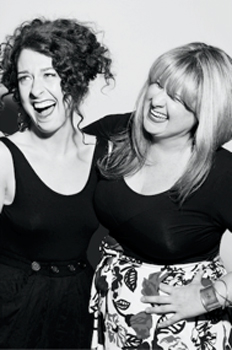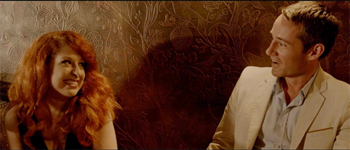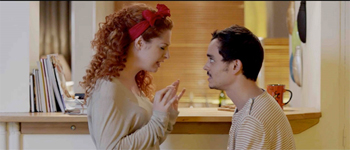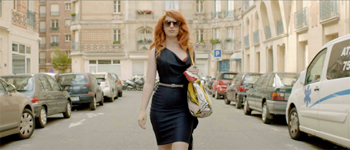Sophie and Dominique Mathisen Drama Interview

Sophie and Dominique Mathisen Drama Interview
Nothing about the production or distribution of new Australian feature film, Drama can be labelled conventional. Aussie sisters, Sophie and Dominique Mathisen, are true disruptors in the space. Sophie wrote, directed and starred in Drama and Dominique produced it. They have created this indie charmer their own way, on their own terms. By bypassing the traditional film making norms, pretty much unchanged since the 70's, these women are pioneering the way for other enthusiastic film makers.
With no government funding on offer Drama was entirely privately funded via a crowdfunding campaign and private equity. In an Australian first it will be released via a -day and date' model, making it available online the same day it hits the cinemas, and the project enforced a gender quota of minimum 50% female across all departments. It is a thoroughly modern model.
Drama is set entirely in Paris and London. It celebrates the value of friendships that often outlast the relationships with those that share our beds. The film follows Anna, an Australian actor living in London. It's been a year since she split with John and she isn't landing auditions. Anna travels to Paris to the home of her best friend Jean. He seems settled with his French partner Phillipe. Anna's timing isn't great though, Phillippe's mother is dying and it's taking its toll on both of them. Thankful for an excuse to escape, Jean dedicates his time and attention to Anna who is devoted to another task entirely. Drama is the story of the selves we once were and the selves we long to be. It's a story of grief for the many roads in life we could have travelled but didn't. It's an honest portrayal of people at their worst, trying to do their best.
Drama explores the unique closeness possible between a gay man and straight woman. 'Romantic love is not necessarily the cornerstone of our lives anymore," explains Sophie. 'These days you are less likely to find -the one' and more likely to find -one of many'. Close, enduring friendships are often the true love stories of our time. Friends are the families we create."
The cast also includes Nicole Da Silva (Wentworth, Doctor Doctor) and Tom Wren (Winners and Losers, Underbelly), both long-time friends of the Mathisen sisters, who donated their skills to the project. Jean is played by Jonathan Burteaux, Sophie's real life bestie, and Philippe is performed by Francois Vincentelli. The film's soundtrack features strong emerging acts including Australian indie breakouts Okenyo, Rackett, Running Young, Phia and with a score written by Blitzberg, formerly Triple J darlings, The Seabellies.
T he sisters hope the film will bring greater awareness to the talent right in our backyards. 'It's frustrating when you see people still clinging to the notion that there aren't as many talented or ambitious women out there. We're everywhere." says Sophie. The film sought out and promoted emerging females in traditionally male departments. Obtaining a credit in this feature has enabled many of the women to go on to work on shows like True Detective and films like Red Dog and The Great Gatsby 'We were determined to give chicks like us a go."
he sisters hope the film will bring greater awareness to the talent right in our backyards. 'It's frustrating when you see people still clinging to the notion that there aren't as many talented or ambitious women out there. We're everywhere." says Sophie. The film sought out and promoted emerging females in traditionally male departments. Obtaining a credit in this feature has enabled many of the women to go on to work on shows like True Detective and films like Red Dog and The Great Gatsby 'We were determined to give chicks like us a go."
The -day and date' release model is popular in the US and Europe. Understanding the generational shift away from the silver screen, the sisters are testing the Australian market with this model. Traditionally distributors and exhibitors require a screening window of up to three months before being able to sell directly to an audience. Drama is bypassing such agreements with contemporary distribution platform FanForce. FanForce books film screenings with cinemas and if enough people buy tickets to the screening it goes ahead.
Drama is the first feature film from Little Sure Shots. It is true independent cinema at its best. Drama comes to Australian audiences after a hugely successful festival circuit including screenings in New York, Los Angeles, Chicago, London, Portland and Paris.
Watch the trailer here.
Drama will be released at cinemas and online ($5 download via iTunes and Google Play) on November 17th. Support these clever Drama Queens and book your cinema ticket today or make a diary note to purchase via download on the 17th.
http://www.afilmcalleddrama.com
https://www.facebook.com/afilmcalleddrama
Interview with Sophie and Dominique Mathisen
Question: How would you describe Drama?
Sophie and Dominique Mathisen: Drama is what my sister and I have termed a "friendship romantic comedy". It's about the closeness between a single woman and a gay man and how that relationship often functions with the intimacy and understanding of a romantic relationship, albeit without the physical connection. I wrote this for my best friend who has been there for me through my lowest points and has ritualistically been the support and agitator for change. We are basically the same person and we often joke that we'll die together covered by the detritus of our respective hoarding habits. We laugh, but there's a real element of comfort in that thought, at least for me.
Question: Where did the idea for Drama originate?
Sophie and Dominique Mathisen: I had been mulling over the idea of using my experience from drama school and beyond in a narrative way since about 2012 and then once I was in London in 2013, it really crystalized. I have been through Drama school twice, once as an undergraduate and as a post graduate and it fascinated me the way that actors often construct their own dramas in order to grow, change, develop, as a form of catharsis. I wanted to explore two characters who were designing a breakdown for themselves, in order to move past the ghosts of the past.
 Question: Can you talk us through how the production and distribution of the film is untraditional?
Question: Can you talk us through how the production and distribution of the film is untraditional? Sophie and Dominique Mathisen: The production of the film was anything but traditional. Firstly, from script to shoot, it was eight months. Growing up in Australia, I was aware that the road to production was longer than what I believe is necessary to retain creative currency. Government subsidy often means that the development windows are longer because there are more designated hurdles. I'm a big believer in the thrill of the hustle and there is no better way to make sure that you are in, boots and all, than pitching direct to your audience or investors. Because we had so little time, government money was off the table. Also, because we were nobodies. No track record, no shorts to our name, it's doubtful our application would have been opened. So we went rogue. I got my university to extend their public liability insurance and we hustled, raised the funds and carted all our gear and a bunch of Aussies working gratis to France. We slept in the house of the lead actor, Jonathan and worked for thirty-one days, no break. Of course, we went crazy but looking back, it was a beautiful experience.
After we finished we did some post in Australia, a small part in London and then more hustling. I think Australia is still not reflexive to independent modelling in cinema and this needs to change. There is an entire generation of makers who are stepping outside the system and for good reason, the reasons for funding, or not funding, is often opaque.
I think the most important aspect of our filmmaking with Drama and moving forward is that we self-selected a fifty percent gender quota across all departments. We did this because we are emerging women and we recognise how hard It is to fight against the dude with the metre long cv - you need to invest in enthusiasm first. We did and were paid back in the hardest working and committed crew imaginable. The women I worked with were and are utter heroes to me, our focus puller, Origa, had eight weeks before given birth to her first child, Luelle, and as she said, it was important that she seized the opportunity and made it work for her because ultimately she wanted to show her daughter, and not just tell, that she could do anything if she applied herself.
 Question: Why did you choose to 'shaking up the industry" with this approach?
Question: Why did you choose to 'shaking up the industry" with this approach? Sophie and Dominique Mathisen: It's hard being women in the industry, fact. It's even harder being women with no resume in the industry. It's always "who?" So we made it an advantage, we used the outsider status to work for us. We looked around for what is working in the industry and went there. The system is broken, no buts about it. We need to put our big person pants on and throw ourselves totally into this strange new world where we watch more, pay less and demand the same. We can figure out how to make this new horizon work for everyone but we need to stop slamming down our fists and expecting everyone to go back to the time before they could stream movies on the train. When you look at the way women are making and distributing content, it's far more reflective of this new frontier because we are the first to be kept out of the old boys' club way of doing things. It made sense to surround ourselves with renegades, and that just happened to be a lot of women.
Question: Can you explain the -day and date' release model?
Sophie and Dominique Mathisen: Very popular in the States, it places the film online and in cinemas simultaneously. The first film to do it to scale was called Margin Call by J.Chandor and it's a fantastic test case. Rather than the two platforms working against one another, they complimented. How many times do you see something on TV and wish you could see it in a cinema? We aren't able to do it in Australia because of the relationship between distributors and exhibitors (cinemas), they have an unspoken, unbreakable "handshake" that often leaves films in no man's land for months because once it doesn't attract the numbers to make it a "hit" in the first week, it's pulled and then you can't make it accessible to your online audiences. It's strongly connected to why Australians are rampant pirates when it comes to content - we want it when it's current and that's ok. Well we've done it as close as we can - cinemas and online for one night and should people love the film online they are able to bring it back to cinema. It's a version but I'd love to see Australia shake up the way we have been and allow for greater flexibility across exhibition windows, it's better for everyone, from audience to maker.
Question: What do you hope audiences take from Drama?
Sophie and Dominique Mathisen: That good Australian independent cinema exists and deserves attention. We shot on the same cameras Ridley Scott just used on Alien and we used cast Australians that everyone recognises but we did it quickly, cheaply and well. We need to devote more time to the things that go unnoticed, the films that are at the Dendy for a blink of an eye, the ones without screen agency logos because that is the future.
 Question: How did you go about casting for Drama?
Question: How did you go about casting for Drama? Sophie and Dominique Mathisen: Nicole is a great friend of Dom and myself, Tom Wren and I went to drama school together. I wrote the film for Jonathan and myself. Jonathan showed me a beautiful French show called Clara Sheller, basically the French Will and Grace, that Francois Vincentelli was starring in and so I just thought, why not, let's send him the script. We hunted down his address and sent him the script with a note saying "I'd love you to play the role of Philippe". I got an email about a week later asking if I could meet in Paris so I caught the train the next day and we shook hands - he'd return from his family holiday early and give me eight days. It was dream. He's a beautiful, warm and generous actor and he is so magnetic on screen, I cannot wait to work with him again. As an actor, I think I understand how paltry and disappointing a lot of scripts can be that when you read something that feels authentic, real, and not just a 'job', you'll move mountains to do it, to feel close to the reason you wanted to act in the first place.
Question: What was the most challenging aspect of Drama?
Sophie and Dominique Mathisen: Independent filmmaking takes fortitude and lots of it, especially in distribution. Anyone can make a film and that's true but getting it out there, Dom most recently noted, is like the Lord of the Rings and it's true. We send each other Frodo and Sam memes and gifs nearly every day because we have breakdowns all the time, moments of elation, doubt, fear, anger, reprisal. The industry is big and unwieldy and at times it feels like it's crashing down on you, the tidal wave of factors you can't control seem insurmountable. But you gotta get to the peak and throw that ring in the fire. I can't tell you how important it has been to have my sister during it all. We are the best of friends and allies and it really make us an unstoppable force once we get this film out there.
Interview by Brooke Hunter
MORE
- Mission: Impossible Fallout
- Glenn Close The Wife
- Allison Chhorn Stanley's Mouth Interview
- Benicio Del Toro Sicario: Day of the Soldado
- Dame Judi Dench Tea With The Dames
- Sandra Bullock Ocean's 8
- Chris Pratt Jurassic World: Fallen Kingdom
- Claudia Sangiorgi Dalimore and Michelle Grace...
- Rachel McAdams Disobedience Interview
- Sebastián Lelio and Alessandro Nivola...
- Perri Cummings Trench Interview



